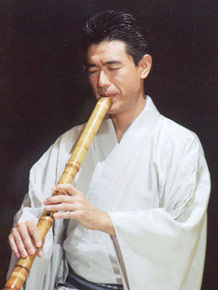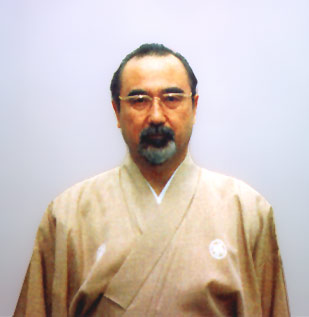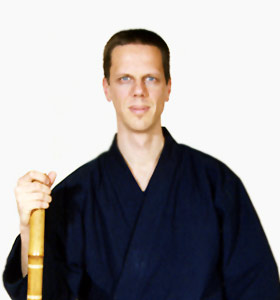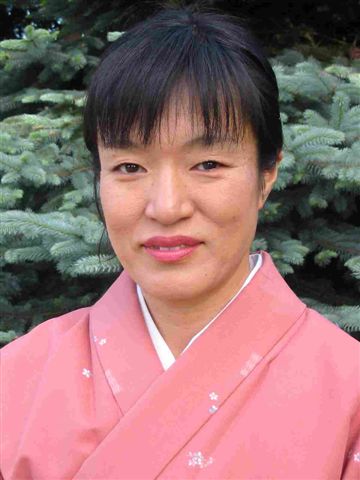
Kaoru Kakizakai was born in Chichibu, Saitama Prefecture in 1959 and started playing the kena while he was in his teens. At 21 he started playing the shakuhachi in the Kinko style. His teacher recognized an unusual ability to play so he recommended him to study with the master, Yokoyama Katsuya. He graduated from the NHK Traditional Music Conservatory and is the winner of the prestigious Kumamoto All Japan Hogaku competition. He has recorded with Yokoyama sensei on his CDs and videos and is a popular leader of shakuhachi workshops for the International Shakuhachi Training Center (Kokusai Shakuhachi Kenshukan) in Tokyo. He performed Toru Takemitsu's November Steps with the NHK Symphony Orchestra conducted by Charles Dutoit and Hiroyuki Iwaki and with the St. Petersburg Philharmonic in Russia, conducted by Akira Naito. He has performed extensively in America, Europe, Asia, and Australia and is a faculty member of the Boulder Colorado summer intensive camps as well as the Australian Shakuahchi Festivals. Currently he is a research fellow at the Tokyo College of Music, full time instructor for the International Shakuhachi Kenshukan and NHK Culture Centre, and President of the International Shakuhachi Kenshu-kan Chichibu School and Higashi Yamato School.

Born in Yokohama, Japan, Matama started playing Shakuhachi at the age 17. After graduating from Hosei University with a degree in History, he began studying shakuhachi seriously with Yokoyama Katsuya for over the last 30 years. In 1972-73 he successfully passed the NHK audition and graduated from the NHK Special School of Traditional Japanese Music.
Since then Matama has participated in several international tours to Europe, South America, Asia, Australia, and the U.S. with Yokoyama and other top Japanese musical groups. He served as one of executive members of the ground-breaking "International Shakuhachi Music Festival in Bisei" in 1994 both as a planner, manager, as well as a player. In 1999 and 2000 he also helped establish the "Australian Shakuhachi Music Festival in Sydney and Brisbane". Matama is currently director of "Ramposha-Chikushin Kai" under the direction of Katsuya Yokoyama. In addition, he is a ecturer for the International Shakuhachi Research Centre and exectutive director of the Yokohama Chikushin Kai.

Peter Hill started his musical studies at age seven with the piano. At 17 he was encouraged by his teacher to pursue a career as a concert pianist, but chose to attend university instead. An interest in Daoist philosophy lead him to study the Chinese language, and after finishing college he went to China and Taiwan for two years, where he studied the Daoist classics Laozi and Zhuangzi. It was while living on Taiwan, in 1988, that he first heard shakuhachi, and within six months he had moved to Kyoto, where he began studying with Kurahashi Yoshio. In 1998 he performed at the shakuhachi festival in Boulder, CO. In 1999 he met Taniguchi Yoshinobu, who strongly encouraged him to learn the Doukyoku style of playing of Watazumi Douso and Yokoyama Katsuya, and in 2001 he returned to Japan, where he has been studying with Yokoyama sensei and Kakizakai Kaoru. In August 2002 Peter won the "New King of Shakuhachi" competition in Tokyo, becoming the first non-Japanese player to do so, and attaining the highest score in the history of the competition. He also performed at the concurrent 2002 Tokyo shakuhachi festival. Although not well-known outside Japan, Peter's powerful sound and passionate renditions of the honkyoku repertoire are highly regarded among Japanese players, and have won him high praise from his teachers as well as other Japanese shakuhachi masters such as Taniguchi Yoshinobu, Ishikawa Toshimitsu, and Sugawara Kuniyoshi. Peter was recently awarded his "shihan" teaching degree by Yokoyama Katsuya, and is planning to release his first CD in the summer of 2004, when he returns to the West to begin his career as a shakuhachi teacher and performer.

Mitsuki is a graduate of Japan's renowned Kunitachi College of Music. Due to the strong influence of western (European) arts in Japan, curriculums are devoted almost entirely to the study of western music and theory. Consequently, Mitsuki, like most Japanese, grew up with virtually no exposure to traditional Japanese music. She entered college with the intent of pursuing western classical music, but during the course of her studies felt drawn to the non-western traditions of Eastern Europe, the Middle East, and Asia. Interests in these areas eventually led Mitsuki on a circuitous route to a discovery of traditional Japanese music and the Koto.
In 1988 she began her studies with the Sawai Koto Institute, and in 1994 she graduated with the 10th class of the intensive "Sawai Koto Seminar", with instruction by modern Koto Masters Tadao and world renowned Kazue Sawai. Even today she continues a warm friendship and advanced mentoring from the venerable Sawai.
A founding member of both the "All Sums" Koto ensemble, which has performed extensively throughout Japan since its inception in 1995, and the newly formed U.S. Koto ensemble called "Koto Phase", which has performed multiple concerts in Chicago and San Francisco, Mitsuki's musical background is both diverse and extensive as a performer and innovator. Not limiting herself to music traditionally associated with the Koto, she often incorporates western, pop and improvisational elements and arrangements, allowing her to relate the Koto's appeal to a variety of audiences. She also has several compositions of her own inspiration to her credit and having earned respect as a personable and uniquely skilled cultural performer in the Northwest, is increasingly being sponsored by the Japanese Consulate-General of Portland, OR.